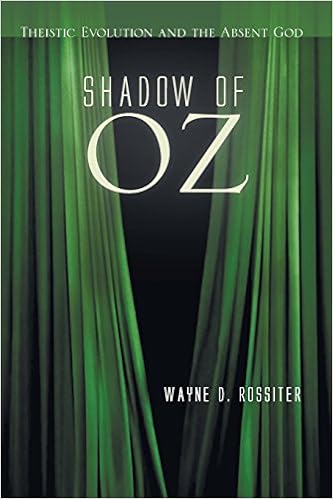 Waynesburg University (Pennsylvania) biology prof Wayne Rossiter, author of In the Shadow of Oz, offer some thoughts on the recent PLOS One uproar over a paper that mentioned a creator:
Waynesburg University (Pennsylvania) biology prof Wayne Rossiter, author of In the Shadow of Oz, offer some thoughts on the recent PLOS One uproar over a paper that mentioned a creator:
Nothing says tolerance, reasonability and openness like the impetuous knee-jerk proscription of the innocent. The psychological condition of the modern scientist was again on display this past week in the journal PLOS One, where a conga line of educated professionals reverted to the primitive behavior of irrational vitriol and chimp-like poo-slinging. It all started when (what appears to be) a faulty Chinese-English translation resulting in the term “Creator” being inserted in a scientific
It all started when (what appears to be) a faulty Chinese-English translation resulting in the term “Creator” being inserted in a scientific article on the biomechanics of the human hand. Now, the cooler heads suggested that the paper actually contained good science, and should not be retracted.
However, cooler heads did not prevail. Instead, the riotous and frenzied majority got their bloody wish; a full retraction of the paper.
And, of course, PLOS One was required to do so. After all, they had scientists calling for the editor’s head, threatening to retract their own papers from the journal, openly declaring that they would step down from editorial and reviewer positions at the journal, and that they would never again submit a paper to it. (Many of these statements can be found on the journal page for the retracted article). In interacting in social media with my fellow comrades (scientists), I saw similar (if not more explicit) opinions. Even Jerry Coyne—who never misses a chance at belly-flopping into a crowded pool—jumped in, fangs first.
Now, two points need to be made regarding this incident. First, as one commenter pointed out,
The phrase ‘the creator’ has nothing to do with a designer god from the two-party-state, the Afro-Eurasian sky deity, or Mr Paley’s writings, but is a well-known ancient Chinese way of saying something alike ‘nature’ or ‘evolution.’
For those who actually read the article (the number of which appears to be appallingly small), they will see overt appeals to the evolutionary process as the “Creator” in question.
But perhaps more importantly, is that the inflexibility of the scientific community on this issue clearly illustrates a Pavlovian reflex against anything suggesting the hand of intelligence in the natural world.
This is ironic. After all, the scientific community was not up in arms when Polanyi published “Life’s irreducible structure” in 1968 (in the journal Science). As far as I’m aware, nobody threatened to pull their papers from the journal. But, today they would.
Nor are the scientists alarmed at the massive number of papers favoring intelligent design in the form of directed panspermia. As long as your “Creator” is some hyper-intelligent alien, we call it science. It was good enough for Nobel Prize-winner Francis Crick and his co-author Leslie Orgel (1973), who suggested that, “organisms were deliberately transmitted to the earth by intelligent beings on another planet.” And, it’s been good enough for science every day since (for example, here, here, and here).
Unseen hyper-intelligent aliens? Kosher. Unseen hyper-intelligent creators? No. On my local country music radio station, I often hear Bill Engvalls’s standup routine “Stupid people (here’s your sign).” In the case of the scientific community, “here’s your mirror.”
(As a self-promoting plug, a recent book I co-authored makes the case that the scientific community is perfectly open to the reality that immaterial objects and laws exist, and that intelligence is detectible. What they reject is the idea that such an intelligence can be immaterial or external to the physical universe. So again, abstract objects and metaphysical universe-producing mechanism? Science. The detection of material intelligent agents? Science. The idea that an intelligent agent could produce a universe? Not science.)